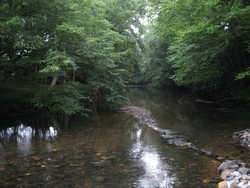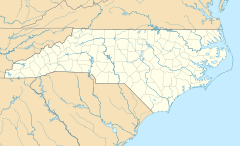Linville, North Carolina facts for kids
Quick facts for kids
Linville
|
|
|---|---|

Linville River
|
|
| Country | United States |
| State | North Carolina |
| County | Avery |
| Founded | 1883 |
| Named for | William and John Linville |
| Area | |
| • Total | 1.78 sq mi (4.62 km2) |
| • Land | 1.78 sq mi (4.62 km2) |
| • Water | 0.00 sq mi (0.00 km2) |
| Elevation | 3,665 ft (1,117 m) |
| Population
(2020)
|
|
| • Total | 283 |
| • Density | 158.54/sq mi (61.23/km2) |
| Time zone | UTC-5 (Eastern (EST)) |
| • Summer (DST) | UTC-4 (EDT) |
| ZIP code |
28646
|
| Area code(s) | 828 |
| GNIS feature ID | 2812776 |
Linville is a small, charming community in the mountains of North Carolina, United States. It's located in Avery County. Linville is a popular spot for summer vacations, especially because it's nestled in the beautiful Blue Ridge Mountains. About 283 people lived here in 2020. It's also famous for hosting the Grandfather Mountain Highland Games, which are big events celebrating Scottish culture!
Contents
A Look Back in Time
Linville was founded a long time ago, in 1883. It was designed by Samuel T. Kelsey from Kansas. The community was named after William and John Linville. Sadly, they were killed by Cherokees in 1766.
The "Tweetsie" Train
From 1916 to 1940, a train called the East Tennessee and Western North Carolina Railroad (or "Tweetsie") ran through Linville. This train was an important way for people and goods to travel. However, a huge flood in 1940 washed away the tracks. Later, in 1956, the old train route became a road called NC 105.
Where is Linville?
Linville is found in the eastern part of Avery County. It's right in the middle of the amazing Blue Ridge Mountains. This community is surrounded by tall mountains on all sides.
Surrounding Mountains
To the east, you'll find Grandmother Mountain. Flat Rock is to the southeast. To the west is Pixie Mountain, and Moore Mountain is to the northwest. Brier Knob is to the north, and Grandfather Mountain is to the northeast.
Waterways and Lakes
Most of the water in Linville flows into the Linville River. This river runs right through the area. Some water also drains into Lake Kawahna to the south or Grandmother Lake to the east. Linville is located east of the Eastern Continental Divide. This means its water flows towards the Atlantic Ocean.
Fun Things to Do
Linville is a great place for outdoor activities and relaxation. There are several places where you can enjoy golf and other sports.
Golf and Country Clubs
The area has four country clubs that are open from late spring to early fall. These include Grandfather Golf and Country Club, Linville Land Harbor Golf Club, Linville Golf Course, and Linville Ridge. They offer beautiful courses for golf lovers.
Grandfather Mountain Adventures
Right next to Linville is Grandfather Mountain. This famous mountain is known for its incredible "mile-high swinging bridge." Walking across it is a thrilling experience! The beautiful Blue Ridge Parkway is also nearby, offering stunning scenic drives.
Historic Buildings
If you like history, you can visit the Linville Historic District. It's located between Hickory Lane and Mitchell Avenue. Here, you'll see many interesting buildings that were built between 1892 and 1940. They show what the community looked like a long time ago.
Famous People from Linville
- Hugh Morton: He was a talented photographer and a big supporter of nature conservation. He helped develop Grandfather Mountain into the amazing place it is today.
See also
 In Spanish: Linville para niños
In Spanish: Linville para niños
 | Kyle Baker |
 | Joseph Yoakum |
 | Laura Wheeler Waring |
 | Henry Ossawa Tanner |


